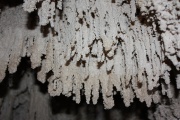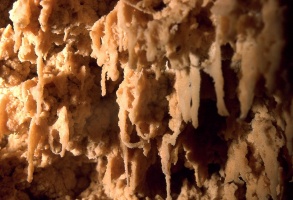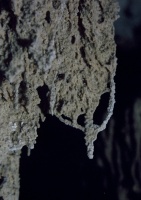Calcite (Inventory)/Pool Finger
From LagWiki
(Difference between revisions)
(Move the new image to the gallery) |
(Removed an obvious statement to tighten the prose) |
||
| Line 1: | Line 1: | ||
{{Inventory image|File:Pool fingers.JPG|Pool fingers}} | {{Inventory image|File:Pool fingers.JPG|Pool fingers}} | ||
| - | + | '''Pool fingers''' are finger-like [[Calcite (Inventory)|calcite]] formations that appear in [[Water (Inventory)/Pool|pools]] and former pools usually under [[Calcite (Inventory)/Shelfstone|shelfstone]]. Many pool fingers resemble [[Calcite (Inventory)/Stalactite/soda straw|soda straws]] but are more lumpy, have no internal canal and sometimes form loops. They look like calcite coated strings or filaments and are believed to have a biological origin that is just that: mineral coated microbial filaments. | |
| - | + | ||
| - | + | ||
Most pool fingers are less than 1/2 mm wide and extend downward into the pool or former pool from under shelfstone. They may be associated with other pool formations such as [[Calcite (Inventory)/Spar/chenille/pool|chenille and pool spar]] and even [[Calcite (Inventory)/Helictite/subaqueous|subaqueous helictites]]. | Most pool fingers are less than 1/2 mm wide and extend downward into the pool or former pool from under shelfstone. They may be associated with other pool formations such as [[Calcite (Inventory)/Spar/chenille/pool|chenille and pool spar]] and even [[Calcite (Inventory)/Helictite/subaqueous|subaqueous helictites]]. | ||
Revision as of 23:48, 29 May 2013
Pool fingers are finger-like calcite formations that appear in pools and former pools usually under shelfstone. Many pool fingers resemble soda straws but are more lumpy, have no internal canal and sometimes form loops. They look like calcite coated strings or filaments and are believed to have a biological origin that is just that: mineral coated microbial filaments.
Most pool fingers are less than 1/2 mm wide and extend downward into the pool or former pool from under shelfstone. They may be associated with other pool formations such as chenille and pool spar and even subaqueous helictites.
Look for pool fingers in pools or anywhere a former pool may have existed especially under shelfstone.
See also
References
- Palmer, Arthur N. (2007) Cave Geology CAVE BOOKS, Dayton, OH pp 296-297 ISBN-13: 978-0-939748-66-2, ISBN-10: 0-939748-66-5
- Hill, Carol; Paolo Forti (1997) Cave Minerals of the World (Second Edition ed.) National Speleological Society pp 86-87 ISBN: 1-879961-07-5



